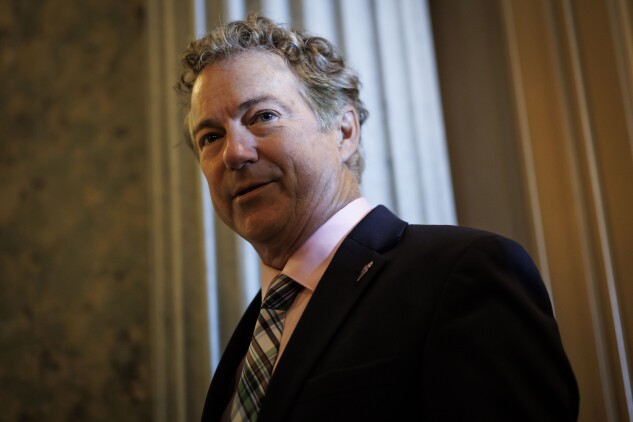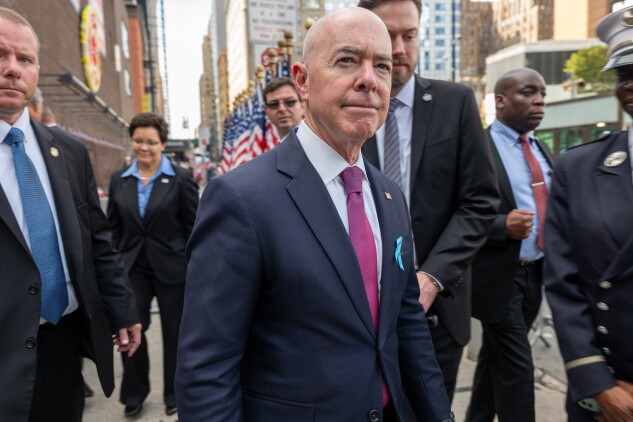- Sunsets coming up for counter-drone, weapons authorities
- Politics, competing priorities threaten program renewals
The Department of Homeland Security is staring down expiration dates for a slate of protection measures with no guarantee Congress will step in to preserve them.
Lawmakers already let one program lapse: standards to keep dangerous chemicals out of terrorists’ hands. DHS’s powers to combat threatening drones and root out weapons of mass destruction are also due to expire this year.
The convergence of sunset dates creates pressure for swift congressional action at a time when deep ideological divides and partisanship have strained Congress’s ability to do just about anything.
“Who would have ever thought CFATS could have gone down?” Rep.
The threatened programs face assorted barriers to renewal, including ideological opposition and low visibility compared with marquee fights over government funding and impeachment. Americans will be at risk should Congress fail to renew the safeguards, homeland security specialists say.
“What I worry is about the idea that we’re not shoring up our defenses at a time when it’s hard to predict where the next attack or serious threat is going to come from,” said former DHS counterterrorism official Tom Warrick, now at the nonpartisan Atlantic Council.
Using Leverage, Casting Blame
The rapid succession of expiration dates is just a coincidence but one with steep potential consequences.
The expired chemical standards, CFATS, required high-risk sites to maintain tight security measures and allowed them to vet prospective employees and contractors against the federal terrorist watch list.
The House voted to renew the program days before its sunset, but Sen.
Chemical Industry Warns of Risks as Congress Lets Rule Lapse
Paul is firm in his position, saying he’s intent on using whatever leverage he has — with CFATS or other forthcoming expiration dates — to push what he believes is “good for government.”
“As long as I have any leverage, I’ll ask them for something I want,” the Kentucky senator said in an interview.
Some colleagues are nervous. Paul is asking reasonable questions about redundant regulations, but allowing the standards to lapse while asking those questions may create risk, said Sen. James Lankford (R-Okla.), who cosponsored the renewal bill. “I don’t think he’s trying to make us unsafe, but it is a difficult way to test it,” Lankford said in an interview.
Homeland Panel’s Bipartisan Style Buckles Under GOP Border Focus
“I can tell you that if Democrats were in charge, CFATS would have been on the top of our authorizing agenda, right alongside the other expiring measures, and we would have gotten the job done long ago,” Thompson said in a statement to Bloomberg Government.
House Homeland Security Chairman
Looming Deadlines
The political dynamics on Capitol Hill are raising questions about Congress’s ability or willingness to renew additional DHS tools.
Secretary
“There is a compelling need for Congress to act and reauthorize or renew several vital DHS authorities and offices,” Mayorkas said in a statement to Bloomberg Government.
Next on the calendar is the expiration of the government’s power to take down dangerous drones. Officials have logged increasing drone incursions around sporting events, airports, and the US-Mexico border, and DHS fears devastating consequences if a drone operator targets a crowd or infrastructure.
Homeland Agency Uses Drone Flights in Push to Renew Defenses
Counter-drone authorities expire later this month, and the Biden administration is seeking to both renew and expand them. But the many House and Senate committees with overlapping jurisdiction have failed to coalesce on a path forward. Proponents are now trying to attach an extension to some broader legislation, such as an appropriations bill, but are facing uncertainty as government funding talks falter.
Fast-forward to December, and another expiration hits: the authorization for DHS’s Countering Weapons of Mass Destruction Office. The law that created the office requires it to be terminated after Dec. 21 should Congress fail to renew its authorization. The division’s 240 employees are responsible for ensuring the US can detect and prevent chemical, biological, radiological, and nuclear threats.
Troubled Weapons of Mass Destruction Office Set for Overhaul
DHS has provided numerous briefings to lawmakers and congressional staff to describe how letting authorities expire would leave the US vulnerable to an array of threats, said a senior DHS official, who spoke anonymously to discuss details of the various expiring programs. And Congress provided the authorities in the first place after recognizing security risks and determining the department could responsibly mitigate them, the official added.
Broader Struggle
Uncertainty over the renewal of DHS authorities reflects Congress’s broader struggle to manage the breadth of urgent issues on its plate, said
“There’s so many of these big issues that seem to be expiring here at the same time that naturally some of those issues are going to be put on the back burner,” Guest said, adding that he’s concerned matters like chemical security will be lost in the shuffle.
Higher-profile deadlines are looming for Congress to pass government funding legislation, reauthorize the Federal Aviation Administration, and write a new farm bill, to name a few.
“Sunsets can have a useful forcing function for Congress to conduct oversight, but the downside of them when it comes to national or homeland security authorities is that it risks a department’s ability to actually do its job,” said Center for a New American Security senior fellow Carrie Cordero, who’s also a member of the Homeland Security Advisory Council.
The fact that individual bills may “flounder” stems from Congress’s refusal to consolidate oversight over DHS in the 20 years since its inception, Warrick, of the Atlantic Council, said. With DHS jurisdiction split among dozens of committees, lawmakers have repeatedly updated DHS powers piecemeal, rather than trying to do comprehensive legislation to respond to evolving threats.
Homeland Security Revamp Effort Seeks to Skirt Turf Skirmishes
Bad actors inside and outside the US, meanwhile, are watching the next steps in Congress and looking for opportunities to sow chaos, said Patricia Cogswell, a former DHS official now at the consulting firm Guidehouse.
“Congress’s delay in reauthorizing and advancing the authorities as needed to meet these threats really creates a risk for national security,” she said.
To contact the reporter on this story:
To contact the editors responsible for this story:


